U.S. Should Accept Putin’s Offer to Negotiate on Nukes
The Russian president has opened the door for the two most powerful nuclear powers on the planet to resolve their differences.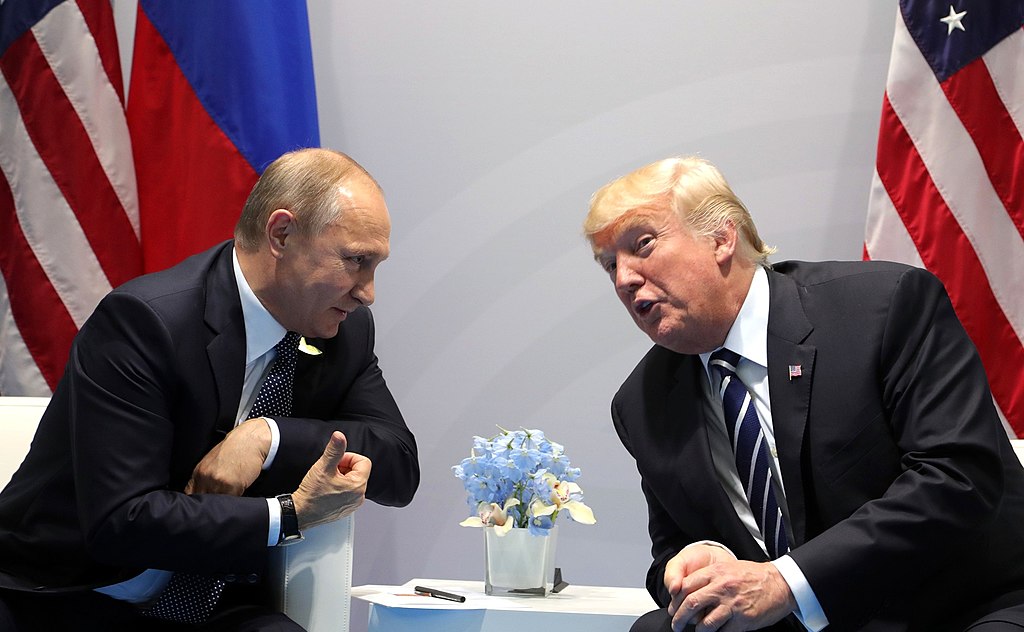 Russian President Vladimir Putin and Donald Trump at the 2017 G-20 Summit in Germany. (Kremlin / Wikimedia)
Russian President Vladimir Putin and Donald Trump at the 2017 G-20 Summit in Germany. (Kremlin / Wikimedia)
On Thursday, Russian President Vladimir Putin delivered his state of the nation address. Much of his speech focused on economic issues and proposals to improve the Russian economy and well-being of the Russian people. Putin did, however, devote a portion of his speech to what he called “the most important defense issue.” He was referring to Russia’s next generation of strategic nuclear weapons designed to overcome U.S. missile defense systems and, thereby from his perspective, assure the effectiveness of Russia’s nuclear deterrent force and restore the global strategic balance.
Putin began his remarks on nuclear arms by harking back to the U.S. unilateral withdrawal from the Anti-Ballistic Missile (ABM) Treaty in 2002, a treaty he described as “the cornerstone of the international security system,” due to the limits it placed on missile defense deployments. He recalled Russian efforts, before the U.S. withdrawal and subsequent to it, to dissuade the U.S. from abrogating the treaty, efforts that were all rejected out of hand. He stated, “All our proposals, absolutely all of them, were rejected.”
It is not well understood in the U.S. that there is a strategic relationship between offensive and defensive missiles. Although it is doubtful that missile defenses would ever work as planned, the leaders of a country whose offensive missiles are subject to being destroyed by missile defenses must assume that they would work. In his speech, Putin explained this relationship of defensive and offensive missiles by pointing out that “uncontrolled growth of the number of anti-ballistic missiles” by the U.S. “will result in the complete devaluation of Russia’s nuclear potential.” This situation, Putin argued, requires Russia to build new offensive nuclear arms capable of penetrating the U.S. missile defenses in order to maintain “strategic stability” and not allow the U.S. to develop a perceived first-strike capability.
The U.S. has been dismissive of this Russian concern, arguing that its defenses are only meant to stop attacks from small powers such as North Korea or Iran (although Iran has no nuclear arms). However, it is a clear and often repeated concern of Russia, just as it would be to the U.S. if Russia were placing missile defense installations near the U.S. border and around the world. Putin stated, “Let me recall that the United States is creating a global missile defense system primarily for countering strategic arms that follow ballistic trajectories. These weapons form the backbone of our nuclear deterrence forces, just as other members of the nuclear club.”
Putin mentioned new Russian strategic nuclear weapons that would be fast, powerful and able to evade ballistic missile defenses. One of these new missiles, known as Sarmat, he described as “untroubled by even the most advanced missile defense systems.” He also discussed development of new types of nuclear-powered strategic arms that do not use ballistic trajectories. These he depicted as “invincible against all existing and prospective missile defense and counter-air defense systems.”
Russia’s new strategic weapons systems do not change the balance of power between the U.S. and Russia, though the U.S. may point to them in justifying its own plans to modernize every aspect of its nuclear arsenal at a cost of $1.7 trillion. Russia’s new offensive nuclear weapons will only bring the ongoing nuclear arms race to a position of strategic stability.
The fuel for a new nuclear arms race was already on the fire, and a Russian strategic response was predictable, when the U.S. withdrew from the ABM Treaty and began developing and emplacing missile defense systems globally. The U.S. withdrawal and abrogation of the ABM Treaty may prove to be the greatest strategic blunder of the nuclear age.
New York Times writers Neil MacFarquhar and David Sanger, reporting on the speech, observed that Putin had “threatened the West with a new generation of nuclear weapons. …” But in my reading of the speech, it seemed not to be a threat but rather an announcement that Russia has found a way to assure strategic stability by developing a nuclear force that can’t be destroyed in a U.S. first strike, with the U.S. able to use missile defenses to knock out a Russian retaliatory attack with any of its missiles that survive the initial attack.
Putin offered a critique of the recent U.S. Nuclear Posture Review, saying it lowers the threshold for the use of nuclear arms, including “in response to conventional arms attacks and even to a cyberthreat.” This is a valid critique.
Putin goes on to state: “Any use of nuclear weapons against Russia or its allies … will be considered a nuclear attack on this country. Retaliation will be immediate, with all the attendant consequences.” So long as nuclear weapons exist, this kind of posturing, while unfortunate, is to be expected by the logic of nuclear deterrence and is similar to statements U.S. leaders have made.
Putin became conciliatory near the end of his address, stating, “There is no need to create more threats to the world. Instead, let us sit down at the negotiating table and devise together a new and relevant system of international security and sustainable development for human civilization. We have been saying this all along. All these proposals are still valid. Russia is ready for this.”
The U.S. should take him up on this offer. As the two most powerful nuclear powers on the planet, with enough nuclear weapons to end civilization as we know it and possibly the human species, the two countries need to be engaged in productive and good-faith negotiations to end the nuclear weapons threat to each other and to all humanity.
Putin has opened the door for the two countries to negotiate to resolve their differences.
Now it is up to the U.S. to respond.
Your support is crucial…With an uncertain future and a new administration casting doubt on press freedoms, the danger is clear: The truth is at risk.
Now is the time to give. Your tax-deductible support allows us to dig deeper, delivering fearless investigative reporting and analysis that exposes what’s really happening — without compromise.
Stand with our courageous journalists. Donate today to protect a free press, uphold democracy and unearth untold stories.
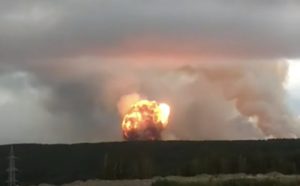
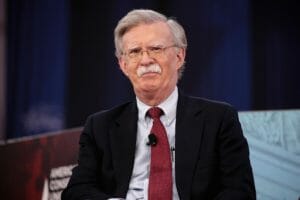
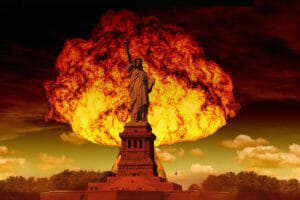
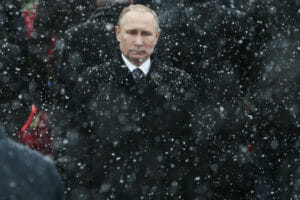
You need to be a supporter to comment.
There are currently no responses to this article.
Be the first to respond.